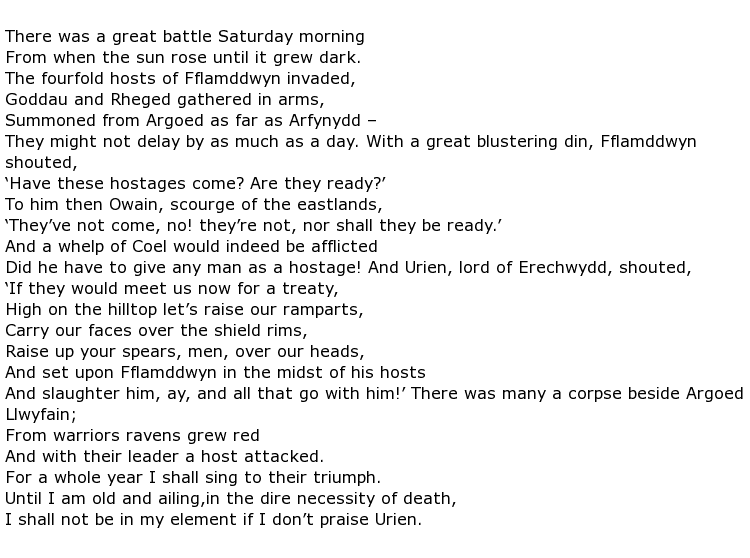 Taliesin, according to Welsh legend, was a 6th century poet and minstrel who reputedly was a bard at the court of King Arthur, and possibly two other Celtic kings besides. The problem is though that most of what has been written down about him is very much based on legend. In this case it is difficult to separate actual events from probably fictitious ones, but his story has elements of romance, excitement and outright superstition to make the reading of it of some interest to many people. At the time that he lived very little would have been written down, the custom being to tell stories out loud for entertainment and then pass them on through the generations. It is likely that most of his work survived in this way until eventually being captured several hundred years later in the fabled Book of Taliesin.
Taliesin, according to Welsh legend, was a 6th century poet and minstrel who reputedly was a bard at the court of King Arthur, and possibly two other Celtic kings besides. The problem is though that most of what has been written down about him is very much based on legend. In this case it is difficult to separate actual events from probably fictitious ones, but his story has elements of romance, excitement and outright superstition to make the reading of it of some interest to many people. At the time that he lived very little would have been written down, the custom being to tell stories out loud for entertainment and then pass them on through the generations. It is likely that most of his work survived in this way until eventually being captured several hundred years later in the fabled Book of Taliesin.
The story goes that he was born around the year 534 AD, possibly in the mid-Welsh region of Powys, and it seems that he was found as a baby, Moses-like, floating in a river in a basket. He was found by a man named Elphin while on a fishing expedition for salmon. Elphin noted the “whiteness of the boy’s forehead”. A “radiant forehead” translates in Welsh as tal iesin, hence the child’s adopted name.
As he grew up his fame and renown meant that he was popular at the royal courts and some have called him Taliesin Ben Beirdd, which means “Chief of Bards”. Even into the Middle Ages his reputation was still shining brightly and many romantic legends were attributed to him. The Book of Taliesin is difficult to date as some have said that it first appeared in the 13th century while others have it as late as the 15th century. It contains some 56 poems, the contents being primarily celebrations of Celtic kings such as King Urien of Rheged and King Brochfael Ysgithrog of Powys. Naturally great victories won in battle were eulogised by the Bards of the day and Taliesin included many of these.
An example of Taliesin’s stirring, heroic poetry was The Battle of Argoed Llwyfain, and it is reproduced below:

There are anomalies in the Book of Taliesin, here and there, mostly as a result of the original compositions being in Old Welsh and some being changed slightly in translation. There are mythological and religious pieces that may or may not have been originally written by Taliesin. Much later, in 1968, the English progressive rock group Deep Purple released an LP called The Book of Taliesyn which was partly inspired by the original, mystical poetry. The song Listen, Learn, Read On contained elements of medieval fantasy and it’s writer, singer Rod Evans, admitted to being inspired by the Welsh poet when later interviewed about the composition.
Estimates for the length of Taliesin’s life put him at around 65 years of age when he died around 599 AD. There is a Bronze Age hilltop burial chamber at Ceredigion called Bedd Taliesin which is reputedly his final resting place. Alternative places of burial have been suggested, of course, but Bedd Taliesin seems to be the most likely location.

